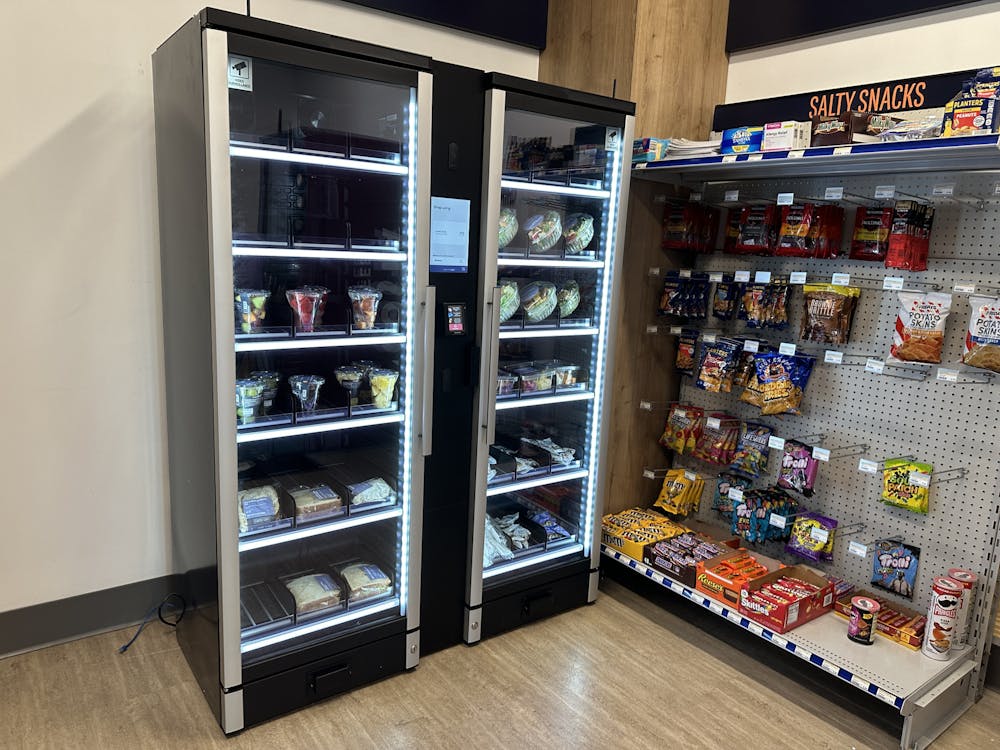Last week, Campus Dining introduced AUto Eats, a series of grab-and-go coolers aimed at providing students with fresh food options.
Jack Hilton, senior in finance and SGA senator, likened the coolers to "vending machines for fresh food.” The coolers work through a system of scanners and scales, allowing inventory to be taken automatically. Customers are charged only after the cooler doors close, signaling the transaction is complete.
Like the vending machines on campus, students can use dining dollars to pay for items in the coolers, which are accessible 24 hours a day. Current prices range from $3.80 for a fruit cup to $10.45 for a garden salad.
The university placed the first two of five coolers in the respective Colleges of Nursing and Forestry, Wildlife and Environment buildings on Nov. 2. Glenn Loughridge, director of Campus Dining and Concessions, said the placement reflects an absence of dining options around those buildings.
While the nursing school has a convenience store, Loughridge said the often-unpredictable hours many nursing majors work make it difficult to staff the store when it’s most needed. The coolers will provide nursing students with 24-hour access to ready-to-eat meals.
The convenience store model also presents challenges to the university, namely space and cost, according to Loughridge. He said the products in the coolers have similar prices to comparable items in stores across campus.
Likewise, Loughridge noted the closing of the Terrell Dining Hall left many on the edge of campus with limited access to dining options. Both the forestry and nursing buildings were near the former dining hall, which closed last spring.
The university plans to place the rest of the five coolers in Boyd and Sasnett Halls and on the ground floor of the Ralph Brown Draughon Library near the Costa Coffee machine. Loughridge said to expect the rest of the coolers to appear across campus in the coming weeks.
Like the dining halls across campus, Aramark, a national food service company, will provide food items for the coolers. According to Loughridge, Tiger Dining makes sandwiches and salads fresh daily to stock the coolers. He also said the university plans to work with popular local restaurants to bring student favorites to campus.
So far, the coolers have been popular among students. Many of the fresh fruit options, as well as the wraps, are in high demand, according to a university employee in the nursing building who requested to remain anonymous.
The future of the coolers largely depends on student feedback, according to Loughridge. Campus Dining will often make decisions in response to students, who Loughridge encouraged to “vote with [their] feet.”
As more students purchase items from the coolers, Loughridge said the university will be able to track which items are most popular. Using this data, Campus Dining will “dial in” on the right offerings for each location.
If the five coolers are successful, Loughridge expects the university to expand to other locations. He said students in the architecture program, which is housed in Dudley Hall, have reached out to him about a lack of food options at late hours.
Continuing to look forward, Campus Dining is working to optimize the accessibility of convenience stores and dining options around campus. While many new technologies excite Loughridge, his primary goal remains “serving the campus the best [he] can” before expanding outward.
Do you like this story? The Plainsman doesn't accept money from tuition or student fees, and we don't charge a subscription fee. But you can donate to support The Plainsman.
Connor Copeland, sophomore in English literature and philosophy, has been with The Auburn Plainsman since fall 2023.





